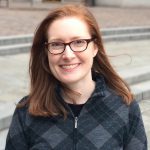
This Conference Update was provided by Laura Wrubel, E-Resources Content Manager at The George Washington University and a 2015 DPLA + DLF Cross-Pollinator Travel Grant awardee.
Dan Cohen kicked off DPLAfest 2015 to a full auditorium at the Indianapolis Public Library saying, “it may not be intimate, but it may be communal.” Throughout the event, I noticed a sense of excitement about new and strengthening relationships, formal and informal, springing from this shared work to create the DPLA.
At the Community Showcase, several participants demonstrated projects connecting members of the local community with the creation of digital collections. I learned about History Harvest and Minnesota’s Immigrants, projects in which oral histories and student interviews of community members created living linkages between the contributors of content and the archive.
For the most part, I participated in the technical track and hackathon. Among the highlights of the track was Corey Harper’s session “Can Metadata be Quantified? Analytics for Libraries,” a walkthrough of his exploratory analysis of DPLA metadata and website analytics, via an iPython notebook. How might we apply computational linguistics techniques, paired with search analytics, to improve the usability of the DPLA metadata and platform? Corey’s work is a great jumping off point to further understanding the DPLA collection and how those who contribute to it might make their metadata most effective for searchers. I was sorry I could not be in multiple places at once, and was glad for the tweeters sharing insights from the other technical sessions, the ebook track, and community rep meet-ups.
The “Introduction to the DPLA API” session—the kickoff to the hackathon—drew nearly 60 people interested in what the DPLA platform had to offer. Many people got up and running with an API key and using the Postman browser extension to explore the DPLA API themselves. Afterwards, a smaller group returned to brainstorm projects to pursue during the hackathon. Ideas included a “local view” of the DPLA collection, Wikipedia integration, an iPython notebook for exploring facet data, and open ebook integration with DPLA.
I joined a small group interested in ways to surface whimsical content from DPLA that would appeal to a broad range of people. We settled on a Twitter bot, starting with the code from Mark Sample’s DPLAbot as a starting point. Brandon Locke, Alexandra Murray, Scott Young, and I spent the hackathon creating DinnerPLAnsbot. It tweets daily an image from DPLA matching a random selection from a list of the top 1000 most frequently appearing menu items from the 1850s to today from the New York Public Library’s “What’s on the menu?” project. With some critical help from DPLA staff and Chad Nelson, we got it up and running, each contributing from our own particular expertise and all of us learning code that was new to us. Hungry for toast? DinnerPLAnsbot may have suggestions for you.
At the hackathon’s wrap-up—the Developer Showcase—we heard about several projects seeking potential connections between individuals and DPLA content, such as Wonder and the History Project. Ben Armintor showed “dbla,” a project he impressively accomplished in the short period of the hackathon, building the DPLA’s API into the Blacklight search interface. Mark Matienzo revived “Dial-a-DPLA,” an app using Twilio to allow people to call a number and hear a random audio selection. Particularly outstanding was Chad Nelson’s Color Browse project, a fun way to explore DPLA’s images by color. I appreciated the chance to share a project I recently worked on while learning Python, Disaster View, which explores DPLA images of natural disasters.
I’m grateful for the opportunity to have participated in DPLAfest, meeting people doing thoughtful research and development, with open source tools and transparency. DPLAfest deepened my appreciation for the tough technical challenges and hard organizational questions the DPLA staff and members are taking on, and left me impressed with the momentum the community is developing.

